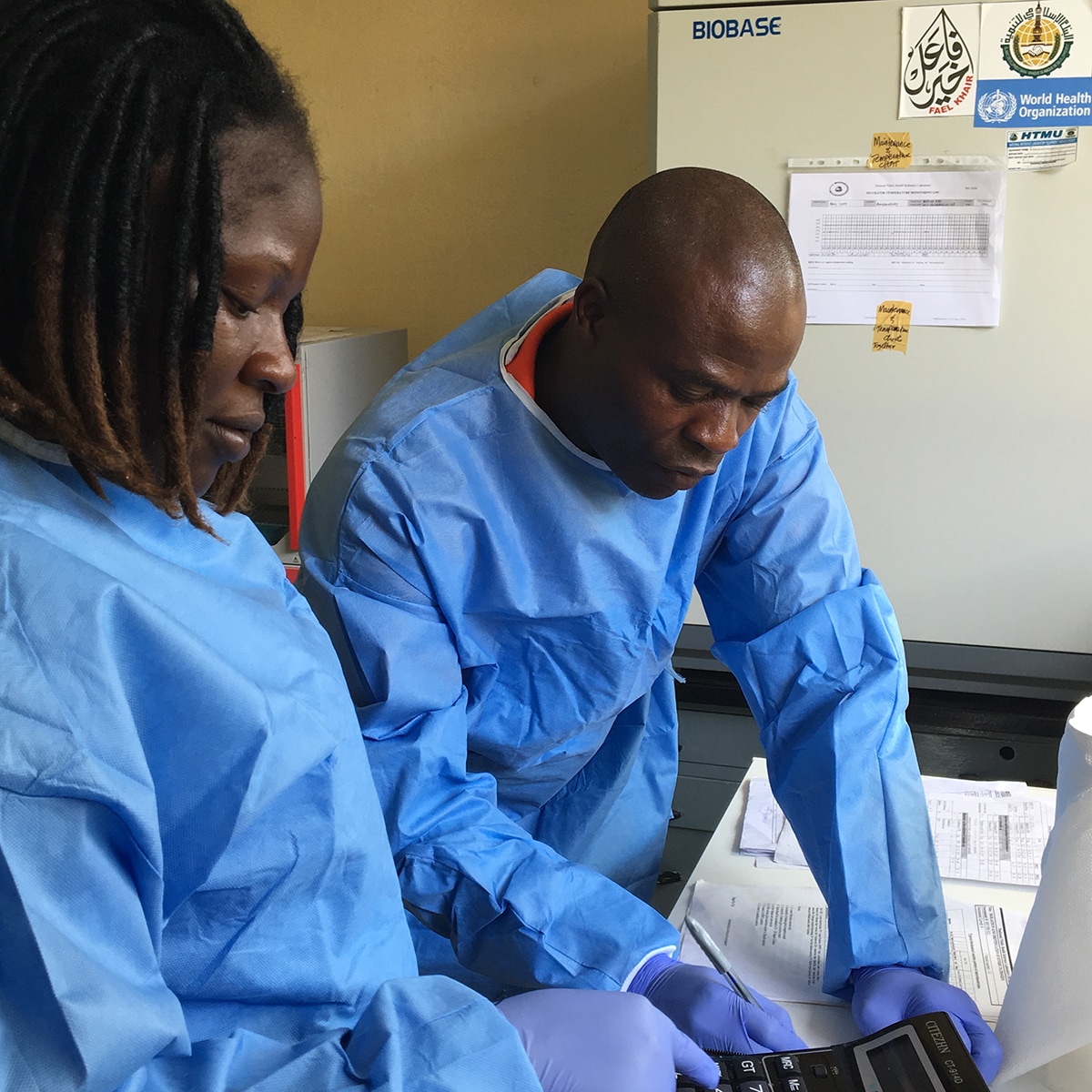About NPHI
What We Do: Create Sustainable Homes for Public Health Expertise

In 2019, National Public Health Institute of Liberia’s bioengineers perform calculations to assess and repair bio safety cabinets as part of the Bio Safety Cabinet Certification training program. (Photo: Dennis Jarvis, CDC)
National public health institutes, or NPHIs, support countries to more effectively prevent, detect, and respond to public health threats. NPHIs are science-driven institutions that lead and coordinate essential public health functions, typically operating within the government under the ministry of health — or closely attached to it.
NPHIs play critical roles in health policy-setting and decision-making through their roles in generating, synthesizing, and interpreting public health data to make timely recommendations. NPHIs help combine the public health functions related to decision making, bringing together data and expertise to coordinate efforts across sectors.
The U.S. NPHI is the Centers for Disease Control and Prevention (CDC) in Atlanta, but many other countries have — or are developing — their own institutes. Building on more than 70 years of experience, CDC helps countries around the world develop and strengthen their own organized, well-functioning NPHIs to protect community health and contain disease close to the source.
Why It’s Important
NPHIs serve as a home to organize and link a country’s public health activities under one “roof,” improving collaboration. Activities may already exist across the health system, but fragmentation can lead to inefficiency and reduced impact. When public health activities are organized and interconnected within an NPHI, countries are better able to:
- Respond to outbreaks quickly
- Use resources efficiently
- Sustain public health system investments
- Foster leadership and accountability
- Maintain a healthy population
By supporting countries which are developing or strengthening NPHIs, CDC helps them become better equipped to collect and use public health data. NPHIs can also plan, implement, and monitor public health programs. Since we live in an interconnected world, a strong NPHI that can contain an outbreak and stops the chain of transmission protects all of us.
How We Do It
Essential public health functions can be done by more than one institution in a country, and may include:
- Disease surveillance
- Emergency preparedness and outbreak response
- Disease-specific control programs
- Public health workforce development
- Occupational and environmental health
- Public health research
CDC’s NPHI program emphasizes high impact, transformative investments. We draw on existing partnerships and scientific expertise within countries in order to promote self-reliance. When countries request CDC’s assistance, we engage with ministry of health officials and national partners to help countries:
- Develop a strategic plan aligned with public health priorities
- Determine any necessary policy changes
- Create a sustainability plan
- Provide technical expertise (which may include linking with other established institutes or U.S. state health departments)
CDC’s role in NPHI development is to provide technical expertise on essential public health functions and is targeted to a country’s public health priorities. In addition, CDC’s engagement may focus on sub-national public health entities that make up a country’s public health system.
Learn about NPHI work.
Read our NPHI Fact Sheet.
Read our NPHI Program Report.
Key Publications
- Khan MS, Dar O, Erondu NA, et al. Using critical information to strengthen pandemic preparedness: the role of national public health agenciesexternal icon. BMJ Global Health 2020;5:e002830.
- Nkengasong, John N. How Africa can quell the next disease outbreaksexternal icon. Nature 2019: 567, 147. https://doi.org/10.1038/d41586-019-00789-4.
- Barzilay E, Vandi H, Binder S, Udo I, Ospina M, et al. Use of the Staged Development Tool for Assessing, Planning, and Measuring Progress in the Development of National Public Health Institutesexternal icon. Health Security 2018 Volume 16, Issue S1: S-18-S-24. https://doi.org/10.1089/hs.2018.0044.
- Bloland P, Simone P, Burkholder B, Slutsker L, De Cock KM. The Role of Public Health Institutions in Global Health System Strengthening Efforts: The US CDC’s Perspectiveexternal icon. PLoS Med 2012 9(4): e1001199. doi:10.1371/journal.pmed.1001199.
- Frieden T, Koplan JP. Stronger National Public Health Institutes for Global Healthexternal icon. The Lancet 2012 376: 1721-2.